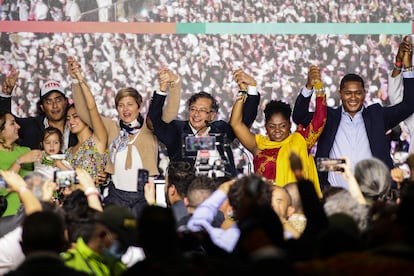Gustavo Petro’s final battle to become president of Colombia
It’s all or nothing for the left-wing leader who will face Rodolfo Hernández at the June 19 runoff


Gustavo Petro Urrego is one step closer to becoming Colombia’s first left-wing president in modern history. In the first round of voting on Sunday, the 62-year-old politician secured a 12-point lead over his main rival, Rodolfo Hernández, a 77-year-old businessman who soared to the runoff with an anti-establishment and anti-corruption message. The millionaire engineer’s shock win over the right-wing candidate, Federico “Fico” Gutiérrez, poses a challenge for Petro. Gutiérrez has already thrown his support behind Hernández, and based on Sunday’s results, the two have more votes combined than the leftist. But statistics are in Petro’s favor: no candidate who has won by a margin of more than 10% in the first round has been defeated in the second. Petro could become the last ex-guerrilla fighter to come to power democratically in Latin America.
This is the third time that Petro has run for president. In 2010, as a combative congressman, he won 9.13% of the vote. In 2018, after a stormy period as the mayor of Bogotá, he received 25.08%, a big improvement, but not enough to defeat current President Ivan Duqué. On both occasions, he was a solitary candidate on a personal mission to fight the establishment. But the fact that he was previously a member of the 19th of April Movement, or M-19, a guerrilla organization that aimed to open up democracy in Colombia, put off many voters. Since his 2018 defeat, Petro has matured. He no longer is a solitary figure, but rather one backed by a broader movement linked with feminist and Afro-Colombian organizations. His running mate is Francia Márquez, a former domestic worker who could become Colombia’s first vice president.
Today’s social climate is also more receptive to Petro’s platform. The current economic model appears to have failed, traditional political parties have lost all credibility and the elites are unable to connect with a large section of the population that continues to live in very precarious conditions. This mounting discontent came to the fore in last year’s protests in Colombia, which swept across the country and brought cities to a standstill. The Duque government responded by repressing demonstrators, which further increased mistrust in the institutions. Petro has been able to channel some of the discontent of a population that feels detached from democracy and the party system – but not all of it, otherwise, he would have won more than 50% in the first round and avoided a runoff.
Petro does not want to govern Colombia, he wants to transform it. His projects sometimes sound so ambitious that it is difficult to conceive that someone could execute them in a four-year mandate. Petro has said that he will not seek re-election, the same promise that former presidents Álvaro Uribe and Juan Manuel Santos made and then reneged on. If elected, Petro wants to carry out the agrarian reform that is included in the peace agreement with the Revolutionary Armed Forces of Colombia (FARC), but that has yet to be launched. He also wants to stop oil and coal exploitation, and move Colombia towards clean energy. The problem is that these resources account for half of the country’s exports and the state is not in a strong economic position.
Colombia has a fiscal deficit of 80 billion pesos, almost 8% of the budget. President Duque tried to address the problem in 2021 with a tax reform, but misstepped in both the timing of the measure – during the middle of the pandemic – and the target of the tax – food. The reform sparked mass protests that intensified into widespread social unrest, and Duque was forced to withdraw it. If elected, Petro says he will introduce a different kind of tax reform: he will cut subsidies for hydrocarbon production, and increase taxes on companies that exploit land.
In the previous election, Petro’s rivals attacked him for his relationship with Cuba and Venezuelan leaders Nicolás Maduro and Hugo Chávez. But this year, the topic hasn’t even come up. He has assumed a moderate profile, even announcing that he would want renowned professor José Antonio Ocampo, from Columbia University and the former executive secretary of the UN Commission for Latin America and the Caribbean (CEPAL), to lead the Finance Ministry. Both Petro and Ocampo agree that Colombia needs to move away from the extractivist model that has dominated Latin America for centuries.
Tu suscripción se está usando en otro dispositivo
¿Quieres añadir otro usuario a tu suscripción?
Si continúas leyendo en este dispositivo, no se podrá leer en el otro.
FlechaTu suscripción se está usando en otro dispositivo y solo puedes acceder a EL PAÍS desde un dispositivo a la vez.
Si quieres compartir tu cuenta, cambia tu suscripción a la modalidad Premium, así podrás añadir otro usuario. Cada uno accederá con su propia cuenta de email, lo que os permitirá personalizar vuestra experiencia en EL PAÍS.
¿Tienes una suscripción de empresa? Accede aquí para contratar más cuentas.
En el caso de no saber quién está usando tu cuenta, te recomendamos cambiar tu contraseña aquí.
Si decides continuar compartiendo tu cuenta, este mensaje se mostrará en tu dispositivo y en el de la otra persona que está usando tu cuenta de forma indefinida, afectando a tu experiencia de lectura. Puedes consultar aquí los términos y condiciones de la suscripción digital.








































